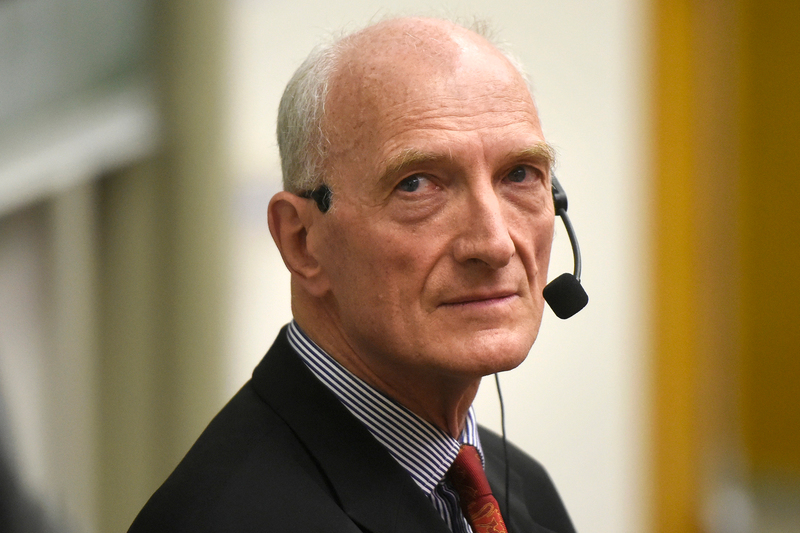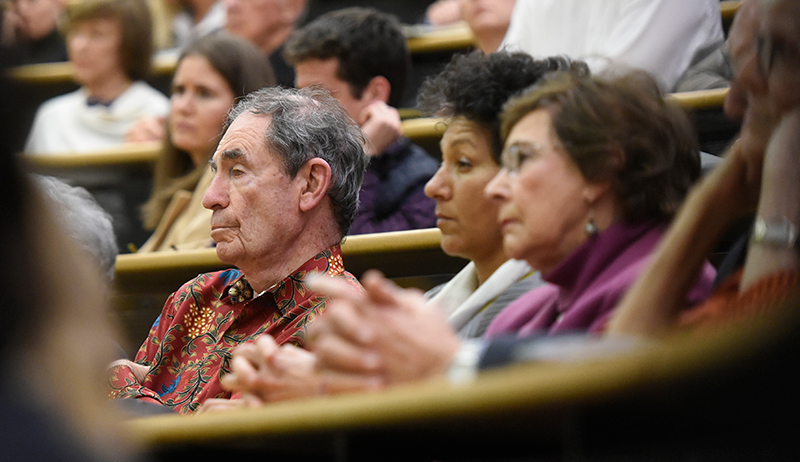Harsher penalties no panacea for high crime – Cameron
13 September 2019 | Story Helen Swingler. Photos Brenton Geach Read time 10 min.
Harsh carceral conditions and minimum sentences offer false promise to the country and are “a useless and costly diversion” from the real problems in the criminal justice system, recently retired Constitutional Court Justice Edwin Cameron argued during his 2019 Rabinowitz Lecture in the University of Cape Town’s (UCT) Faculty of Law.
Addressing a full house on Wednesday, 11 September, on the eve of the release of Stats SA and the South African Police Services 2018/2019 crime statistics, Cameron stressed that there are no quick fixes when it comes to crime.
“Minimum sentences are pointless and divert us from what we should be doing,” he said.
Instead the focus should be on institutional regeneration, improvement in police intelligence, improvement in crime prevention, improvement in prosecutions, and improvement in police response.
“However, the real and only solution to the crime rate is to recognise that the sole inhibiting institutional response to criminal conduct is the certainty of detection, the certainty of follow-up, the certainty of arraignment, the certainty of prosecution – and the certainty of punishment.”
In this sequence of certainties, length of sentence plays no role whatsoever, he added.
“That is where our crime response has failed us.”
“Pointless punishment”
Prisons are not places of rehabilitation, but overcrowded institutes of pointless punishment, he said. And each prisoner, whether in remand or sentenced, costs the country R10 000 a month.
“The blunt point is this: We do no good at all by finding and prosecuting a haphazard segment, a sliver of rapists and murderers, and sentencing them to life, jamming our prisons. We have 18 000 lifers in our prisons (in 1995 there were 400). What possible point is there to having 18 000 people [sentenced] to life in prison when we have 20 000 murders every year?”
The country’s “fatally flawed and defective criminal justice system” needs systemic reform, he said.
“We do no good at all by finding and prosecuting a haphazard segment, a sliver of rapists and murderers, and sentencing them to life, jamming our prisons.”
“What we should be doing requires a long, slow process of improving police capacity, not necessarily the numbers; we have enough police people, and 450 000 private security officers.
“We must improve competence, responsiveness and skill. We must restore crime intelligence, unmask criminal syndicates and improve the turnover in the National Prosecuting Authority (NPA). We need, at a neighbourhood level, police responsiveness and competence.”
In the wake of countrywide protests against gender-based violence and at a campus still reeling after the death of first-year film and media student Uyinene Mrwetyana, Cameron said he understands the emotional responses to crime.
What can be done immediately? First, abolish minimum sentences for all lower-level, non-violent crime, particularly fraud, extortion and drug offences. Second, release elderly offenders, those over the age of 50, when the risk of recidivism diminishes markedly. This should be done according to individual assessment.
Third, make bail conditions better and more efficient. Fourth, a sentencing council should be constituted to articulate clear sentencing principles, “on a flexible basis, not to tie us up in rigid knots”.
“We are struggling so much to stop ourselves from drowning that we aren’t learning to swim. We are so stuck in our crisis that we are not seeing the solutions available to us.”

Justice Kate O’Regan’s Khayelitsha Commission Report, an inquiry into allegations of police inefficiency and a breakdown of relations between the police and Khayelitsha community, was an example of a set of highly practical recommendations.
“None [of the recommendations] have been implemented… in a township where the murder rate is 71 per 100 000 people, against a national rate of 33 per 100 000 and three per 100 000 in New York.
“In the light of this, there is absolutely no point in any calls to bring back the death penalty and I honour those politicians who have had the courage to say it.”
Promise of a new system
While democracy had brought the promise of a new, more humane prison system, the anticipated reduction in crime levels did not happen. In the first decade after democracy crime rose by 30%.
“The truth is realistic comparable stats were hard to come by. Bantustans had been excluded before…. But certainly, the public perception was crime was much higher and this generated a pall on the new democratic leadership and its tough-on-crime approach.”
This radical shift saw the adoption of a new suite of legislation, harsh new policies embodied in harsh new laws. Minimum sentencing provisions were introduced. Getting bail became a lot tougher, the Correctional Services Act complicated police processes, and the Prevention of Organised Crime Act cast a much wider criminal net.
“No thought has been given to the impact on sentencing patterns and carceral conditions in terms of overcrowding.”
There was a glimmer of hope when Minister of Justice Dullah Omar appointed a committee of the South African Law Reform Commission to consider sentencing policy and alternatives. But the new government didn’t wait for the report. Instead, said Cameron, the new sentences were deliberately introduced: harsher punishment, limiting access to bail, increasing sentence jurisdiction, lengthening prison terms, limiting cause for discretion and lengthening parole periods.
“Minimum sentences included non-violent crimes and worse, all drug offences. The minimum sentences regime was meant to tide the country over to restore confidence in the criminal justice system.
“Like temporary classrooms, these became permanent and are still here 20 years later. No thought has been given to the impact on sentencing patterns and carceral conditions in terms of overcrowding. The impact is evident in the great increase of the numbers of people detained and the lengths of incarceration.”
Despite that, people are calling for harsher sentences for criminals.
“It’s a human response, but an entirely futile response,” Cameron said.
“It will not assist the crime wave… I don’t suggest violent criminals don’t deserve harsh sentences, but the point is that in determining justified punishment, minimum sentences are entirely and utterly misdirected.
“We’re shovelling prisoners into a prison funnel and they are not being released. Today we have 18 000 people serving life sentences that are pointless. And there is a harsh pre-parole period. Medical parole is now harder to get, complicated by the distinguished history of Mr Schabir Shaik.”
Prisons and communicable diseases
There are more people in prison, but this increase hasn’t been matched by institutional capacity.
“Overcrowding affects the well-being of prisoners and impedes good governance. There is also a link between violence and maladministration. Prisons are known sites of communicable diseases like tuberculosis. Mental health is a problem from carceral conditions and there are high rates of recidivism, estimated to be between 60–90% (NICRO 2014).
“We have to take stock. We have to think about what we are doing.
“Prisons may be a microcosm of our society. If we want to tackle violence, drug addiction, gang violence, gender-based violence, HIV and other social problems, we must take sufficient care of the prison population.”
“Our dismay and anger at the horrors criminals inflict on us paralyse us and paralyse us dangerously and counterproductively.”
Urgently needed debate on the topic had been hamstrung. First, crime levels increased; fear rises and trust in the criminal justice system declines.
“Our dismay and anger at the horrors criminals inflict on us paralyse us and paralyse us dangerously and counterproductively.”
Second, the slowing economy distracted us; in austere times it’s difficult to argue for reform of the carceral system. Third, there is the issue of race, class and poverty, and voicelessness on the matter of penal reform, without a lobbying group with the intent and persuasiveness of the Treatment Action Campaign, for example.
Fourth, there was institutional disintegration as a result of criminal syndicates taking over the government and institutions, at the very highest level. This has led to the collapse of the institutional capacity of police, particularly crime detection and follow-up services, and of the NPA, sharply aggravated in the Zuma years, he added.
“The result has been a catastrophic loss of focus and capacity. Over nine years our government was plagued by criminally syndicated corruption and institutional disintegration.”
The result was threefold.
“First, public trust in police and the administration of justice sank as botched and malevolently inspired appointments undermined basic functioning. Second, we’ve been distracted from the duties of efficient, publicly-directed governance and institutional build, distracted from important moral debates about crime and punishment. Third, crime has become rampant because of corrupt and incompetent policing and police intelligence.”
Solutions, but no quick fix
Cameron said that the country’s current criminal justice system and approaches to crime are so ineffective and counterproductive that we find ourselves “in a frightening vortex”.
“We are terrified by crime, so terrified that we are trapped in our futile responses, our own self-interest to find solutions that will affect and reduce crime.”
He concluded by likening the situation to the AIDS crisis following the 1994 transition.
“It was a real threat to our democracy, not because of the viral impact … but because we mishandled it so catastrophically. The same applies to crime.”
 This work is licensed under a Creative Commons Attribution-NoDerivatives 4.0 International License.
This work is licensed under a Creative Commons Attribution-NoDerivatives 4.0 International License.
Please view the republishing articles page for more information.










